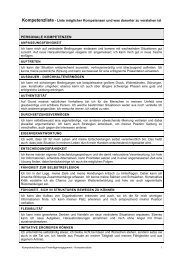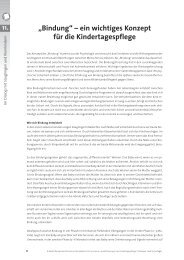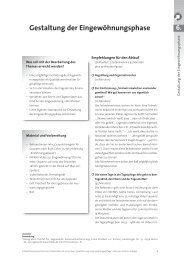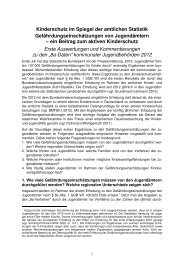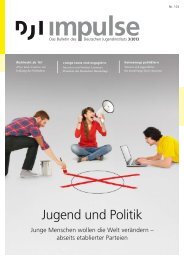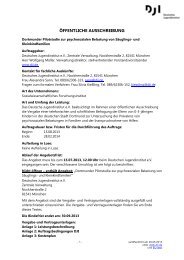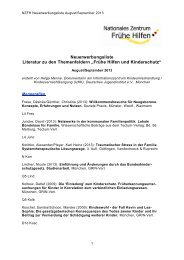Assessing the effects of informal learning on occupational compe ...
Assessing the effects of informal learning on occupational compe ...
Assessing the effects of informal learning on occupational compe ...
Create successful ePaper yourself
Turn your PDF publications into a flip-book with our unique Google optimized e-Paper software.
- The tasks should be typical <str<strong>on</strong>g>of</str<strong>on</strong>g> <str<strong>on</strong>g>the</str<strong>on</strong>g> range <str<strong>on</strong>g>of</str<strong>on</strong>g> tasks carried out in <str<strong>on</strong>g>the</str<strong>on</strong>g> specific<br />
occupati<strong>on</strong>al field.<br />
- Routine tasks should also be required in additi<strong>on</strong> to ‘interesting’ tasks.<br />
- The tasks should allow as comprehensive an insight as possible into <str<strong>on</strong>g>the</str<strong>on</strong>g><br />
(positive and negative) requirements <str<strong>on</strong>g>of</str<strong>on</strong>g> an occupati<strong>on</strong>al field.<br />
- The tasks should be related to <str<strong>on</strong>g>the</str<strong>on</strong>g> c<strong>on</strong>tents required in <str<strong>on</strong>g>the</str<strong>on</strong>g> relevant training<br />
regulati<strong>on</strong>s for <str<strong>on</strong>g>the</str<strong>on</strong>g> occupati<strong>on</strong>al field c<strong>on</strong>cerned.<br />
- The level <str<strong>on</strong>g>of</str<strong>on</strong>g> standard should be appropriate for <str<strong>on</strong>g>the</str<strong>on</strong>g> target group.<br />
- The tasks should evoke patterns <str<strong>on</strong>g>of</str<strong>on</strong>g> behaviour that are meaningful in<br />
relati<strong>on</strong> to <str<strong>on</strong>g>the</str<strong>on</strong>g> observati<strong>on</strong>al criteria.<br />
The observati<strong>on</strong> and assessment are carried out using a four-step scale:<br />
- General occupati<strong>on</strong>al <strong>compe</strong>tences (interpers<strong>on</strong>al <strong>compe</strong>tences such as<br />
individual behaviour in groups, social behaviour in groups, social behaviour<br />
in working c<strong>on</strong>texts; intrapers<strong>on</strong>al <strong>compe</strong>tences such as problemsolving<br />
behaviour, performance behaviour)<br />
- Specific occupati<strong>on</strong>al <strong>compe</strong>tences (work organizati<strong>on</strong>, working speed,<br />
skilfulness, tidiness, independence, behaviour towards subject teachers,<br />
behaviour towards those <str<strong>on</strong>g>of</str<strong>on</strong>g> <str<strong>on</strong>g>the</str<strong>on</strong>g> same age)<br />
- Integrative <strong>compe</strong>tences (reliability, punctuality).<br />
In each individual case, <str<strong>on</strong>g>the</str<strong>on</strong>g> observers compare <str<strong>on</strong>g>the</str<strong>on</strong>g>ir observati<strong>on</strong>s at an<br />
observers’ meeting at which observati<strong>on</strong>s, impressi<strong>on</strong>s, and c<strong>on</strong>clusi<strong>on</strong>s are<br />
exchanged. The principle <str<strong>on</strong>g>of</str<strong>on</strong>g> c<strong>on</strong>sensus formati<strong>on</strong> through discussi<strong>on</strong> generally<br />
applies, ra<str<strong>on</strong>g>the</str<strong>on</strong>g>r than through arithmetical calculati<strong>on</strong>s or majority decisi<strong>on</strong>making.<br />
Ano<str<strong>on</strong>g>the</str<strong>on</strong>g>r very popular approach uses experiential teaching elements in <str<strong>on</strong>g>the</str<strong>on</strong>g><br />
form <str<strong>on</strong>g>of</str<strong>on</strong>g> ‘outward-bound’ or ‘city-bound’ as a ‘supplementary element in <str<strong>on</strong>g>the</str<strong>on</strong>g><br />
<strong>compe</strong>tence establishment procedure’ (Lehmann 2003). This also involves<br />
self-percepti<strong>on</strong>, percepti<strong>on</strong> <str<strong>on</strong>g>of</str<strong>on</strong>g> o<str<strong>on</strong>g>the</str<strong>on</strong>g>rs, recognizing <strong>on</strong>e’s own strengths and<br />
weaknesses, promoting social <strong>compe</strong>tence, etc. (ibid., pp. 183–4).<br />
The data collected more or less systematically during <str<strong>on</strong>g>the</str<strong>on</strong>g> exercises and<br />
games through observati<strong>on</strong> and assessment by o<str<strong>on</strong>g>the</str<strong>on</strong>g>rs may be compared<br />
with <str<strong>on</strong>g>the</str<strong>on</strong>g> data from a self-completed questi<strong>on</strong>naire and self-assessment, so<br />
that statements about self-percepti<strong>on</strong>, self-assessment and self-reflecti<strong>on</strong> are<br />
also possible.<br />
The procedures usually lead to a <strong>compe</strong>tence pr<str<strong>on</strong>g>of</str<strong>on</strong>g>ile and if applicable:<br />
- To a support recommendati<strong>on</strong>, for example in relati<strong>on</strong> to occupati<strong>on</strong>al training,<br />
starting work<br />
- And to <str<strong>on</strong>g>the</str<strong>on</strong>g> establishment <str<strong>on</strong>g>of</str<strong>on</strong>g> a support requirement (relative to specialist<br />
qualificati<strong>on</strong>, key qualificati<strong>on</strong>s, social stabilizati<strong>on</strong>, etc.)<br />
In <str<strong>on</strong>g>the</str<strong>on</strong>g> case <str<strong>on</strong>g>of</str<strong>on</strong>g> <str<strong>on</strong>g>the</str<strong>on</strong>g> Job Casting AC, <str<strong>on</strong>g>the</str<strong>on</strong>g> <strong>compe</strong>tence pr<str<strong>on</strong>g>of</str<strong>on</strong>g>ile includes:<br />
- A list and explanati<strong>on</strong> <str<strong>on</strong>g>of</str<strong>on</strong>g> <str<strong>on</strong>g>the</str<strong>on</strong>g> aspects observed and tested<br />
- A graphic representati<strong>on</strong> <str<strong>on</strong>g>of</str<strong>on</strong>g> <str<strong>on</strong>g>the</str<strong>on</strong>g> observati<strong>on</strong> results<br />
- A written descripti<strong>on</strong> <str<strong>on</strong>g>of</str<strong>on</strong>g> <str<strong>on</strong>g>the</str<strong>on</strong>g> results<br />
- Data <strong>on</strong> biography and self-assessment<br />
- Observati<strong>on</strong> results regarding social behaviour<br />
- Observati<strong>on</strong> results <strong>on</strong> working behaviour<br />
- An explanati<strong>on</strong> <str<strong>on</strong>g>of</str<strong>on</strong>g> <str<strong>on</strong>g>the</str<strong>on</strong>g> test results<br />
- An assessment by <str<strong>on</strong>g>the</str<strong>on</strong>g> instructor.<br />
11 <str<strong>on</strong>g>Assessing</str<strong>on</strong>g> <str<strong>on</strong>g>the</str<strong>on</strong>g> <str<strong>on</strong>g>effects</str<strong>on</strong>g> <str<strong>on</strong>g>of</str<strong>on</strong>g> <str<strong>on</strong>g>informal</str<strong>on</strong>g> <str<strong>on</strong>g>learning</str<strong>on</strong>g> <strong>on</strong> occupati<strong>on</strong>al <strong>compe</strong>tences <str<strong>on</strong>g>of</str<strong>on</strong>g> disadvantaged young pers<strong>on</strong>s





